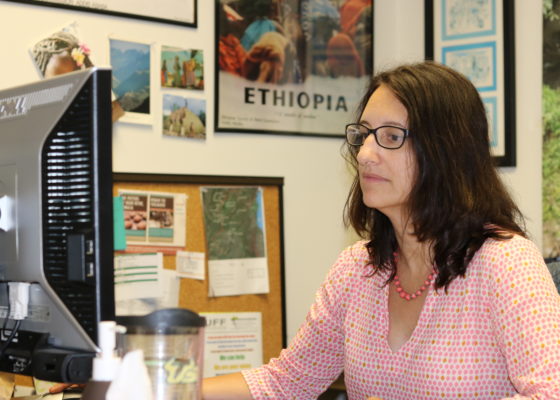By Imani Craig & Vanessa Rivera
Jet-lagged and fulfilled, Dr. Kathy Arthur returned from Kyoto, Japan after attending the World Archaeological Congress (WAC).
WAC was formed by Peter Ucko in 1986, after South African countries were misrepresented and disenfranchised. WAC is an inclusive, nonprofit organization that strives to protect and preserve indigenous culture.

“The board consists of a large number of indigenous archaeologists,” said Arthur. “I wasn’t just attending, I was actively participating in it.”
While at the conference, Arthur gave two separate presentations.
“You don’t necessarily represent your country’s perspectives. Certainly not all of us in the United States are going to agree on what our politicians decide, and we should have academic freedom to be who we are and to represent what we want to represent,” she said.
Enlightening experiences don’t come cheap, so in order to avoid out-of-pocket expenses, Arthur turned to USF funding.
“As a department, we get some travel funds to go to a conference. The amount varies between $500-900, depending on the year,” said Arthur.
Because she knew this amount would not cover her international travel expenses, Arthur said she had to look for further funding elsewhere.
“I applied for a USF system international travel grant so I was able to go,” she said. “[It] is very competitive.”
The transition from being an anthropology professor to giving international presentations did not happen overnight. Indeed, Arthur was exposed to university life from an early age.
“I think that’s one reason I always wanted to be a professor,” she said.
Arthur’s interest in African culture was introduced to and blossomed from the different books her mother gave to her.
Arthur also recounted early memories of her babysitter, who happened to be her mother’s colleague. Her babysitter was an Afrocentric poet who Arthur said really influenced her by opening up conversations about race issues and African culture.
“I was in a really liberal university upbringing and I was not aware of racism,” said Arthur.
“My parents had many international friends. It kind of shocked me that racism existed and I really started to observe it. Everyone needs to know what’s amazing about African culture and what they contribute to the world. And maybe that will help to combat racism,” said Arthur.
While attending the University of Texas in Austin, to her disappointment, there were no African-based classes until her last semester.
“There was a professor they hired who did African archeology and of course I took his course. I begged him every single day to take me with him [to Africa].”
Even after working for two years at the Institute of Classical Archaeology in Italy, Arthur knew that Africa was still where she wanted to be.
“The professor said, ‘If you get into grad school, I’ll take you to Africa.’ So I ended up going to the University of Texas at Austin again, for my master’s, and I worked in Botswana.”
After graduating with her master’s in anthropology, Arthur continued her education at the University of Florida to pursue a doctorate degree in ethnoarchaeology.
She ended up working with the Gamo people from Ethiopia.
“One of the professors who became my advisor said, ‘Look, there are cultures that make and use stone tools in Ethiopia.’ I had done stone tool analysis for my master’s degree and I was surprised no one knew about it. I spent one summer doing a survey traveling to these different cultures in southern Ethiopia with five other grad students”
The stone tools that the Gamo make and use became the focus of Arthur’s study.
When asked about future endeavors, Arthur mentioned her book, “The Lives of Stone Tools: Crafting the Status, Skill, and Identity of Flintknappers,” which is in the process of being published.
“I was on sabbatical in 2014 and 2015, and I wrote a book about stone tools,” she said. “It’s about the Gamo and the different ways in which people understand reality and about being in the world.”
Arthur believes that working with the Gamo people has changed her mindset.
“There’s no reason for me, as an anthropologist, to come up with my own theory because the people that I’m working with should be understanding what their theory is and how they see the world. I really want to understand their culture,” said Arthur.
“It makes me more aware and more open to other perspectives.This all ties in with the conference I just went to and why I’m excited about it, because [it’s] what my sessions were on.”
One of Arthur’s most notable finds to date is the first African genome, excavated in Ethiopia back in 2012, with help from a team that included her husband, Dr. John Arthur.
Arthur continues to work with the Gamo people and looks forward to returning to Ethiopia in 2017.



